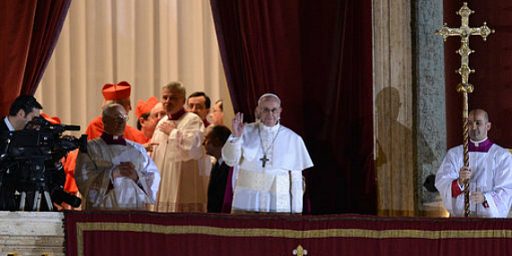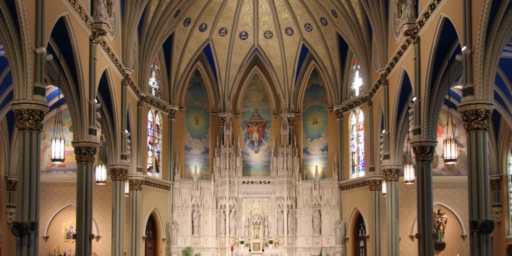Papal Candidates: Jorge Mario Bergoglio, Argentina
It’s hard to question Cardinal Bergoglio’s concern for the poor when he does many things to display humility. For instance, upon receiving his appointment, he instructed supporters to donate the money that they had raised for Vatican festivities. He refused to live in the Buenos Aires archbishop’s palace, choosing instead a small apartment where he prepared his own dinners. He traded in a chauffeured limousine for public transportation. But, beyond his austerity, he’s taken public stances on numerous political and socioeconomic issues that have plagued his native Argentina, which is still recovering from financial turmoil. In this light, perhaps it’s fitting that he once presented a report on behalf of the Synod of Bishops — a position that he described as “keeping watch” for the people.
“Servant of the Gospel of Jesus Christ”
Though he started out as a chemist, Cardinal Bergoglio developed into an accomplished theologian and a strong religious leader. This is particularly evident in his writings on the theological identity of bishops. Note:
The requirement of holiness for bishops has to be over and above the universal call to holiness of all members of the Church as taught in chapter 5 of the Constitution on the Church. The sacramentality of the episcopate is the place where one must go to find the chief reason for the pursuit of holiness. In virtue of this sacramentality, episcopal ordination is not just a juridical act, by which greater jurisdiction is conferred on a priest, but it is an act of Christ who, by giving the Spirit of the supreme priesthood, sanctifies the person ordained and grants the helping graces, which he needs for the realization of his mission and his duties. As a result, each Bishop reaches sanctity mainly in his ministry and by the exercise of his ministry.
Invoking Pope John Paul II, Cardinal Bergoglio places special emphasis on the ministry’s connection to the poor:
One of the characteristics mentioned often by the Synodal Fathers in relationship with the holiness of the bishop is his poverty. The bishop, a man who is poor in spirit, is the image of the poor Christ, imitating the poor Christ, trying to view things with the vision of Gospel poverty. His simplicity and austerity of life confer total freedom in the Lord. The Holy Father invited us to examine “our attitude towards earthly goods and their use … to verify to what point in the Church the personal and community conversion has achieved effective evangelical poverty . . . to be poor at the service of the Gospel” (John Paul II, Homily for the opening Mass of the 10th Ordinary General Assembly of the Synod of Bishops, 30 September 2001, nn. 3-4). With these words, John Paul II challenges us to follow the radicalism of the Gospel which calls blessed those who become poor for the Kingdom, accompanying Jesus in his poverty, living in communion with his brothers according to the apostolic form of life which we read about in the Book of the Acts of the Apostles (Acts 4,32: “The whole group of believers was united, heart and soul; no one claimed private ownership of any possessions, as everything they owned was held in common”).
Cardinal Bergoglio continues with a familial image:
The bishop’s fidelity to the Gospel and his love for the spirit of poverty lead him to a special option in favour of the poor who are at the central core of the Good News of Jesus. The bishop walks with them. The bishop cannot forget that on the day of his episcopal consecration, he was questioned on his intention to take care of the poor. With the passage of time, he should learn to see people as Jesus saw them. He is father and brother of the poor in his diocese. His “contemplative intuition” and his pastoral charity lead him to discover the new faces which “the widow, the orphan and the stranger” of the Scriptures have taken in modern life. The bishop knows that Jesus was God’s compassion for the poor and for this reason enters the life of the poor.
And, of course, poverty is central to the broader mission of social justice and peace:
In this area of missionary activity the Synod fathers pointed out the bishop as a prophet of justice. Nowadays the war of the powerful against the weak has created an abyss between the rich and the poor. The poor are legion. Before an unjust economic system with strong structural inequalities, the situation of the marginalized is worse. Today substantial groups of people suffer hunger. The poor, the young and the refugees are victims of this “new order”. Women in many places are looked down upon and are the object of a new hedonist culture. The Bishop must never tire of preaching the social doctrine which comes from the Gospel and which the Church has made explicit since the times of the early Fathers. Social doctrine is capable of sowing hope, because it gathers us brothers and sisters in divine sonship and makes us realise that there is no hope for the rich unless there is hope for the poor.
“Persevere in the Struggle for the Faith”
Interestingly, John Allen notes that Cardinal Bergoglio disappointed many of his Latin American Jesuit brethren when he pushed for a traditional and spiritual approach instead of “moving into the social apostolate.” Yet he’s lived up to his writings and engaged in public issues. In the late 1970s and early 1980s, he took “conservative positions” during the military dictatorship. Since then, his association with Comunione e Liberazione, a Catholic lay movement, has done little to shed this characterization.
Two years ago, during a gay-pride parade, some demonstrators vandalized the Metropolitan Cathedral with “Church = dictatorship”, “Rapist priests,” and “Nazi priests.” Remarked Cardinal Bergoglio:
In a pluralistic society when minority groups express themselves, it would be logical that they do so respecting the religious sentiments of the majority.
We hope it is understood that when we express our doctrines around sexual conduct, we do so within the standard of truth we believe, but never without an attitude of respect and understanding toward individuals.
Late last year, in response to an art exhibit by a militant atheist, he urged followers to be resolute. According to Catholic World News:
“For some time public expressions of ridicule and insult of our Lord Jesus Christ and the Most Holy Virgin Mary, as well as numerous exhibits against the religious and moral values we profess, have been on display throughout the city,” the cardinal warned.
He lamented that the exhibiting of blasphemous art is taking place at a cultural center that is funded by taxpayer money.
“Jesus warned us that these things would take place, and with much tenderness he told us not to be afraid, that we are his small flock, that we should persevere in the struggle for the faith and in charity, placing our hope in him and praying with the true confidence of children of a Father who loves us,” he added.
But he isn’t always in the midst of controversy. Consider this hospice visit:
Cardinal Bergoglio arrived at the Francisco Muniz Hospital for Infectious Diseases where he washed and kissed the feet of 12 AIDS patient. The Mass that he celebrated there on Holy Thursday was attended by patients, nurses, doctors, volunteers, and relatives. “I come, following the footprints of our only master, Our Lord Jesus Christ, to express how close the Church is to those who must suffer the pain and discrimination,” the cardinal said. After the Mass, Cardinal Bergoglio and the hospital chaplain, Father Andres Tello Cornejo, brought the Eucharist to patients who were unable to attend the ceremony.
“Cardinal Bergoglio’s will to express his solidarity with AIDS victims in such an eloquent way is a courageous decision and a significant signal that brings hope to those who work on the behalf of AIDS victims,” said [Health Minister Hector] Lombardo.
Ultimately, though, it comes back to the poor. When hundreds of thousands of poor Argentinians began to make pilgrimages to San Cayetano, the patron saint of work, Cardinal Bergoglio repeated his familiar message:
“People ask why we spend our time touching a statue when we could be out looking for work,” he said.
“We do it because faith will see us through. We do it because faith endures. We do it because faith is all we have at a time like this.”
Related:
Papal Candidates: An Overview
Papal Candidates: Cardinal Francis Arinze, Nigeria





Robert, if you get time could you also do Tettamanzi and Angelo Sodano? The former is now the co-favorite with Arinze, the latter the head of Opus Dei and apparently getting some buzz.
If, after I complete the next four profiles, there’s time to explore those two other interesting figures, then I’ll certainly do them. No problem, dw.
Excellent. Thanks much, Robert.
Hey, Robert, what about the chances of Mel Gibson getting the nod?
You never know, Kappiy. You never know. 🙂
Hi Robert
I’m the editor-in-chief of the Catholic Herald a (mildly) conservative London broadsheet (website down at the moment, alas). I’d very much like to chat to you before I go out to Rome for the conclave to cover it for the Sunday Telegraph.
Best wishes
Damian
PS I think we agree about the odious Michael Moore!
schoenborn of Austria will be the next pope- period!
HOw about Miloslav VLK, Varkey Vithayathil, Vinko Puljic or Philippe Barbarin?
The keyword here is that he is a Jesuit. I am a graduate of Fordham University, Class of ’62. Thank God that I had four years of Catholic theology taught to me by the Jesuits, also affectionately referred to as the “jebbies.” The order has always been on the cutting edge of progressive theological thinking. I predict that if he is elected we will see optional celibacy for the clergy in his papacy. May God see fit to see him elected pope!!!!
In the last quarter century or so despite angels like Mother Teresa, Catholic Church has drifted away from the core Christian values of humility, simplicity and austerity. Cardinal Jorge Mario Bergoglio embodies these values. Men like this are needed to sheperd the Church and bring Christ back to Christianity.